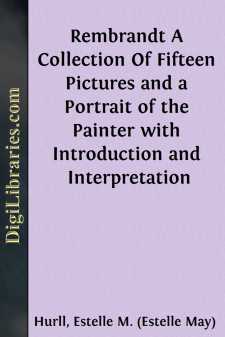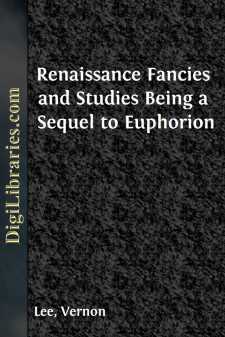Non-Classifiable
- Non-Classifiable 1768
Non-Classifiable Books
Sort by:
by:
James Weir
CHAPTER I.THE ORIGIN OF RELIGIOUS FEELING. I believe that man originated his first ideas of the supernatural from the external phenomena of nature which were perceptible to one or more of his five senses; his first theogony was a natural one and one taken directly from nature. In ideation the primal bases of thought must have been founded, ab initio, upon sensual perceptions; hence, must have been...
more...
by:
Edward King
An Attempt to account for the Production of a Shower of Stones, that fell in Tuscany, on the 16th of June, 1794; and to shew that there are Traces of similar Events having taken place, in the highest Ages of Antiquity. In the course of which Detail is also inserted, an Account of an extraordinary Hail-stone, that fell, with many others, in Cornwall, on the 20th of October, 1791. Having received this...
more...
by:
Edward Morton
CHAPTER I. Of the Breast-Milk, &c. &c. No sooner has the child been ushered into the world than the breasts of the mother pour forth their milk for its sustenance. This bland fluid is secreted from the blood, and varies, in quality and quantity, according to the time which has elapsed from delivery, being peculiarly and wonderfully adapted at every period to the wants of the individual for...
more...
INTRODUCTION I. ON REMBRANDT'S CHARACTER AS AN ARTIST A general impression prevails with the large picture-loving public that a special training is necessary to any proper appreciation of Rembrandt. He is the idol of the connoisseur because of his superb mastery of technique, his miracles of chiaroscuro, his blending of colors. Those who do not understand these matters must, it is supposed, stand...
more...
CHAPTER I THE RECOVERERS OF REMBRANDT Imagine a man, a citizen of London, healthy, middle-aged, successful in business, whose interest in golf is as keen, according to his lights and limitations, as the absorption of Rembrandt in art. Suppose this citizen, having one day a loose half-hour of time to fill in the neighbourhood of South Kensington, remembers the articles he has skimmed in the papers about...
more...
by:
Josef Israels
INTRODUCTION While the world pays respectful tribute to Rembrandt the artist, it has been compelled to wait until comparatively recent years for some small measure of reliable information concerning Rembrandt the man. The sixteenth and seventeenth centuries seem to have been very little concerned with personalities. A man was judged by his work which appealed, if it were good enough, to an...
more...
by:
John Burnet
PREFACE. The high estimation in which I have ever held the works of Rembrandt has been greatly increased by my going through this examination of his various excellencies, and such will ever be the case when the emanations of genius are investigated; like the lustre of precious stones, their luminous colour shines from the centre, not from the surface. With such a mine of rich ore as the works of...
more...
by:
Peter Morse
Rembrandt's Etching Technique: An Example A Rembrandt print in the collection of the Smithsonian Institution has been made the subject of a study of the artist's etching technique. The author is associate curator, division of graphic arts, in the Smithsonian Institution's Museum of History and Technology. All footnotes appear at the end of this paper. Rembrandt's print, Landscape...
more...
INTRODUCTION. The following pages are reprinted, with some alterations and additions, from the columns of the Freethinker. They are neither methodical nor exhaustive. I had the privilege of knowing Mr. Bradlaugh more or less intimately for twenty years. I have worked with him in the Freethought movement and stood by his side on many political platforms. It seemed to me, therefore, that if I jotted...
more...
by:
Vernon Lee
"Panis Angelicus fit panis hominum. O res mirabilis, manducat Dominum Pauper, Servus et Humilis." These words of the Matins of the Most Holy Sacrament I heard for the first time many years ago, to the beautiful and inappropriate music of Cherubini. They struck me at that time as foolish, barbarous, and almost gross; but since then I have learned to think of them, and in a measure to feel of...
more...











